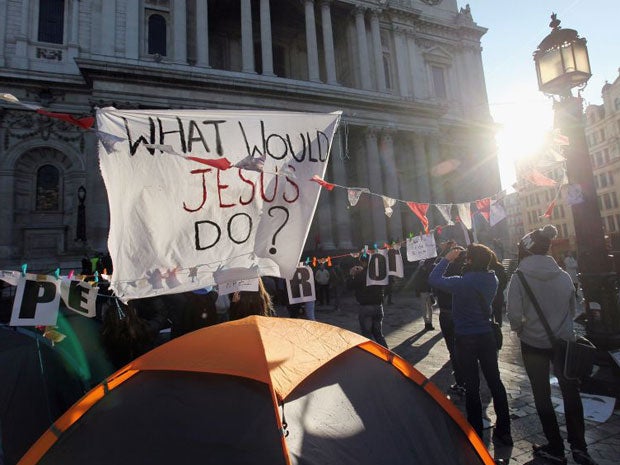St Paul's protesters face legal action

Anti-capitalists camped outside St Paul's were told today that they will face legal action to evict them as the cathedral reopened after being forced to close for a week because of the protests.
St Paul's and the City of London Corporation will seek separate High Court injunctions in a bid to clear more than 200 tents which have been outside the cathedral for almost two weeks.
St Paul's said the action had "regrettably become necessary".
The decision came as the doors of cathedral opened to worshippers after being closed since last Friday - the first time it has been shut to the public since the Second World War.
Hundreds of people attended the Eucharist at 12.30pm today, including some of the protesters.
Michael Welbank, who chaired the transport committee of the corporation which voted to seek injunctions, said: "Protest is an essential right in a democracy but camping on the highway is not and we believe we will have a strong highways case because an encampment on a busy thoroughfare clearly impacts the rights of others."
Stuart Fraser, chairman of policy and resources at the corporation, said: "We have no problem with a peaceable 24-hour protest by people without tents - provided the highway is fully usable - but campsites and important highways don't mix."
A spokesman for St Paul's Cathedral said that the decision to seek an injunction had been taken with "the greatest reluctance".
He said: "At each step of the legal process the Chapter will continue to entreat the protesters to agree to a peaceful solution and, if an injunction is granted, will then be able to discuss with the protesters how to reach this solution.
"Theirs is a message that the Chapter has both heard and shares and looks forward to engaging with the protesters to identify how the message may continue to be debated at St Paul's and acted upon."
The campsite was set up on October 15 after activists organised on Facebook and gathered in the City of London to attempt an occupation of the London Stock Exchange in imitation of anti-capitalist protests in Wall Street.
When police cordoned off the entrances to the square where the stock exchange is located, protesters set up tents in front of the nearby cathedral instead.
The demonstration on October 15 was part of a worldwide day of action by anti-capitalists which lead to violence in cities such as Rome.
Protesters responded by saying they would oppose any legal action taken to remove the tents.
Ronan McNern, a spokesman for the Occupy London Stock Exchange campsite, said the injunctions were only in the "interest of big business".
He added: "This decision will take us into a long and protracted legal battle which will cost a lot of money.
"We will not accept any offer to stay here without the campsite - if you take away the tents you take away the sense of community we have managed to create here."
Earlier the Prime Minister likened the St Paul's camp to the tents in Parliament Square, which have been the subject of numerous efforts to remove them.
David Cameron said: "I do think there is a broader issue here - I'm all in favour of the freedom to demonstrate, but I don't quite see why the freedom to demonstrate has to include the freedom to pitch a tent almost anywhere you want to in London."
Charles Williams, the Dean's Verger at St Paul's, focussed instead on the reopening of the cathedral to the public, saying he was "very pleased".
The reopening follows the resignation of chancellor Canon Dr Giles Fraser, who quit because he feared plans to evict the protesters could lead to violence.
Dr Fraser, who gave his support to the protesters' democratic right to demonstrate the day after they set up the camp, told the BBC yesterday: "I resigned because I believe that chapter was set on a course of action that could ultimately lead to violence, to eviction, to protesters being forcibly moved on.
"I think it's about the church using violence in order to protect itself and that's something that I believe that it shouldn't do."
AP
Join our commenting forum
Join thought-provoking conversations, follow other Independent readers and see their replies
Comments
Bookmark popover
Removed from bookmarks